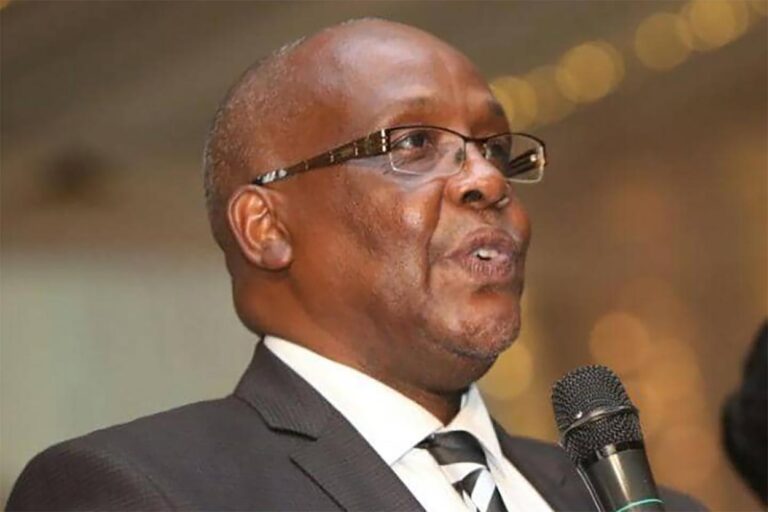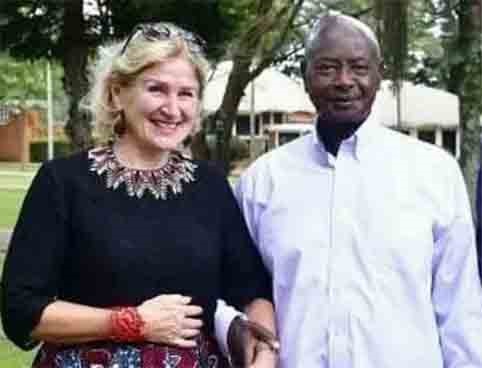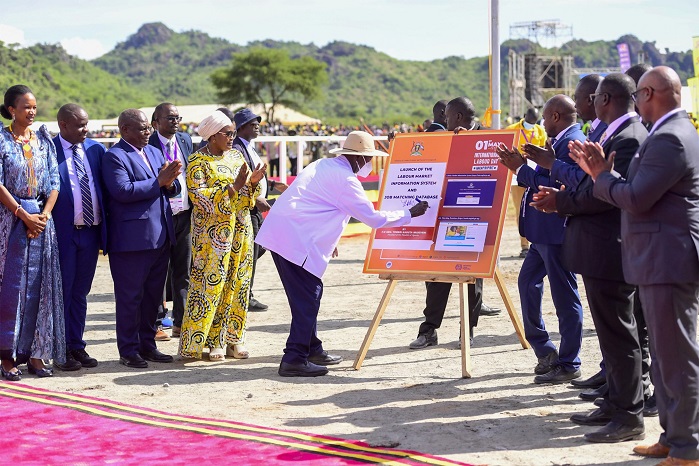
President Museveni appends his signature after launching the Labour Market Information System and Job Marching Data Base on 1st May, 2025
HABARI DAILY I Kampala, Uganda I After many years of waiting and prolonged discussions, Ugandan workers might get their minimum wage pie that is long awaited.
Despite the Minimum Wage Bill being passed by Parliament in February 2019, it was ultimately disallowed by the President in August of the same year.
A minimum wage is the lowest payment that employers cans legally pay their workers. It is also known as the “price base” below which an employee may not accept to sell his or her labour.
The announcement, which still sounds good as a promise, may be Ugandan workers labor Day gift from President Yoweri Museveni, who has hinted at possible significant reforms in Uganda’s labour sector.
“The government is preparing to engage more deeply on key issues, including the establishment of a minimum wage, the phasing out of casual labour, and stricter regulation of employment agencies,” he said during this year’s International Labour Day celebrations held at Nakaale Grounds, Nakapiripirit District.
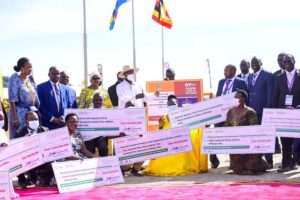
Benefiting organisations under the GROW Project Gender – Inclusive Workplace Infrastructure Grants, which were launched by President Museveni on Labour Day, 1st May 2025 in Nakapiripirit
The event ran under the theme: “Consolidating on the Gains of the Parish Development Model (PDM) for Increased Productivity and Inclusive Job Creation.”
Museveni informed workers that the Cabinet would revisit these matters in June this year to explore realistic and sector-based solutions.
“I had a discussion with workers yesterday at State House, Entebbe. We talked about the minimum wage, the tripartite arrangement, and the issue of casual labour,” he said.
He added: “We shall discuss more in June in the Cabinet. We are also going to look into employment agencies that exploit workers by standing between them and employers.”
The President highlighted that the process would be consultative and rational.
“We must handle things the way they are. The approach we discussed, dealing with issues sector by sector is more realistic,” he added.
President Museveni also criticized the current use of foreign labour in sectors where Ugandans are qualified.
“Why should foreign companies bring their own workers when Ugandans can do the jobs?” he asked, pledging that the government would scrutinize institutions that have historically prioritized foreign over local labour.
Museveni pointed out that according to figures from UBOS, there are 1.4 million workers in the factories, 3.6 million in agriculture, 5 million in services, and 46,000 in ICT.
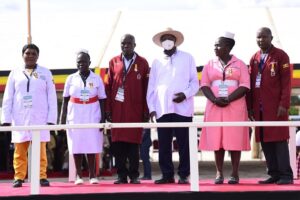
Some of the medal awardees with the President during the International Labour Day Celebrations in Nakapiripirit today
“Now the jobs in the public service are 480,000. Therefore, the jobs in the private sector are very many compared to the public sector. And we are just beginning,” he said.
The President underscored that true job creation stems from building wealth rather than focusing narrowly on employment.
He cited examples of small-scale entrepreneurs empowered through the Parish Development Model (PDM), saying the program was already creating sustainable livelihoods.
Betty Amongi, the Minister of Gender, Labour and Social Development, noted that the labour force remains the backbone of Uganda’s economy.
“Uganda’s labour force is predominantly composed of a young population constituting 73 percent who are under the age of 30, according to the Uganda Bureau of Statistics 2024 Census. This youthful population presents immense opportunities to build a dynamic productive labour force,” she said.
Anyakun Esther, the Minister of State for Labour, Employment and Industrial relations, requested the President for his support in the implementation of the 3rd Decent Work Country Program, saying that it is key in improving working conditions and also influencing labour productivity.
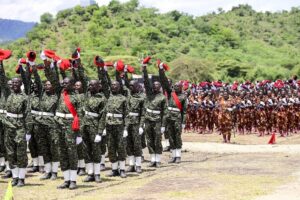
UPDF officers and men matching during the International Labour Day Celebrations in Nakapiripirit today
John Oketcho, the Chairman General of the Central Organization of Free Trade Unions (COFTU), on behalf of the workers, commended the president for the PDM initiative aimed at fighting poverty among Ugandans.
Fred Bamwesigye, the Chairperson of Uganda Federation of Employers, said that Uganda’s inflation has remained relatively stable compared to the rest of the economies, which is good for the workers.
At the same event, 61 persons were awarded with medals for their exceptional service towards the development of Uganda.
The President also launched the Third Decent Work Country Program 2025/26-2029/30, a strategic framework aimed at promoting employment, protecting workers’ rights, and fostering social dialogue in Uganda.
He also commissioned the Labour Market Information System and a new Digital Job Matching system.


